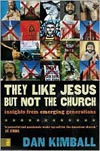A recent special on CNN was titled: “What Is a Christian? Where Do You Fit?” Obviously, many people are interested in the subject, but when it comes to actually entering a church and exploring the life of a congregation, they are hesitant. It would seem that many people like Jesus but not the church. And this dynamic is not limited to non-Christians.
A few years ago I was teaching a course about the church and our culture at a Christian college. Mid-lecture a hand went up, and with all sincerity a student probed, “Do we really need the church?” In this student’s mind the church was not a given. Then it hit me: the classroom was filled with future church leaders. These young Christians were sold out for Jesus and longing to be his disciples, but being sold out for the church was troubling.
|
|
Dan Kimball’s latest book, They Like Jesus but not the Church, tackles this phenomenon. Written by a pastor for pastors, Kimball is strikingly humble in his approach to this topic. (He even includes an appendix that outlines criticisms of the book.) Drawing from his experience with those “outside the church” and displaying a passion for people to be heard, Kimball says, “Christians are now the foreigners in a post-Christian culture, and we have got to wake up to this reality if we haven’t.”
The book is divided into three parts. Part one examines “why emerging generations are changing.” Here, Kimball lays the philosophical foundation built out of his personal experiences and research. Part two takes the reader on a listening tour of “what emerging generations think about the church.” This section may seem long, but Kimball’s ability to capture the voices and experiences of those outside the church makes it a rewarding read. Part three looks forward to “how the church can respond.” Written with hope and keen cultural observation, Kimball welcomes and inspires the reader to live out the truths presented.
Anyone in church leadership should sit down with Kimball’s insights and wrestle with the changes he presses us to consider. Each chapter concludes with questions inviting the reader to look at his own church through the eyes of emerging generations. The price of the book is worth these segments alone, and every church staff would do well to discuss Kimball’s questions.
If you are turned off by the subtitle of the book and the controversies currently swirling around various forms of the word “emerging,” I would invite you to put biases aside. Whether one agrees fully with Kimball’s conclusions is minor in the scope of the invitation he is offering the reader. “The point of this book is to examine what others think of Jesus and of the church so that we can think like missionaries, understanding emerging generations better and speaking more effectively with them about the gospel.” Similarly, despite the trendy cover art and interior graphics, which remind me too much of a junior high curriculum, the content of the book is not as juvenile as it appears and should not deter you from opening the pages.
The point, according to Kimball, is that the church is very important. “So, if your church doesn’t have it all together, don’t be discouraged. I hope that if you gained anything from reading this book it’s that it isn’t about the music or preaching or programs; it’s about having a missional heart, fully dependent on God’s Spirit, and not being afraid to make changes and take risks for the gospel.”
Copyright © 2007 by the author or Christianity Today/Leadership Journal.Click here for reprint information onLeadership Journal.










